A remarkable influence on feminine virtues in ancient Rome, Livia Drusilla was publicly idealized as one of the Roman goddesses, referring to her beauty and intelligence.
She was acknowledged as Rome’s most notable and influential personality for more than half a century.
Her attributes were not based on any patriarchal power or affluence; instead, it was the way she handled governance during ancient Roman interludes.
Correspondingly, luck favored her to marry Octavian, a man who turned out to be the Roman emperor.
In a male-dominated society, where females were deprived of fundamental rights, she acquired unalloyed status in women empowerment.
Women included her in their oaths as a sign of respect. The first lady to appear on state coins, Livia was regarded as the state mother.
Where did Livia Drusilla live?
Content
Livia Drusilla resided in Villa of Livia, an ancient Roman villa in the north of Italy at Prima Porta.
Where was Livia buried?
She was buried in a tomb named Mausoleum of Augustus on Piazza Augusto Imperatore.
Was Livia made a goddess?
She was worshiped by her grandson Claudius and built a statue of the empress after the Greek goddess Hera.
Did she poison Roman Emperor Augustus?
Tacitus and Cassius Dio, Roman historians, wrote about the rumors that she fed Augustus poisoned figs when they were away from Rome; nevertheless, concrete evidence does not exist.
Livia Drusilla
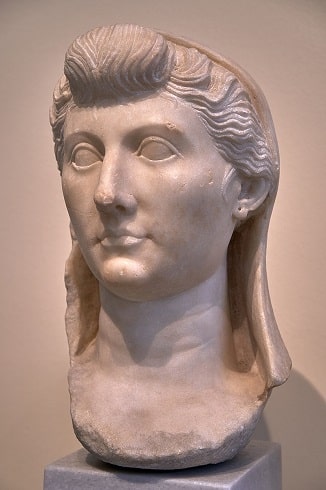
Livia Drusilla(59 B.C- 29 C.E) was a woman of extraordinary potency belonging to the Imperial Roman Times.
She was a strong, manipulative, and dutiful wife to Emperor Augustus, whom she counseled regarding state affairs.
Marcus Livius Drusus Claudianus, a Roman senator, and Alfida, his wife, fathered a daughter in 59 B.C, who grew up in the economic and elite political circles of the Empire.
Her dad, a member of the Claudian family, was adopted by Livians, one of the most authoritative families in Rome.
Livia married Tiberius Claudius Nero in 43 B.C and bore two sons before divorcing him in 38B.C. She remarried Octavian, later known as Emperor Augustus, becoming his third wife.
She became the consort to the king, conspiring to crown Tiberius – her son, from her former husband.
After successfully leading her son to the throne, Livia dominated Roman authorities politically until 29 C (her death).
Livia Drusilla’s Early Life and Marriage
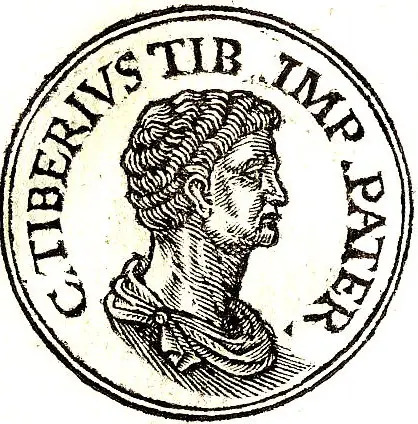
Livia was born to a noble family keenly interested in philosophy and literacy. Irrespective of Livia’s education, she showed no interest in pursuing intellectual or artistic prospects.
At the young age of 15, she married Tiberius Claudius Nero, who was her patrician cousin.
Conjugal alliances between cousins were prevalent to strengthen diplomatic relationships between two families.
She gave birth to Tiberius, her first son, and was pregnant with the second one when she met Octavian for the very first time.
Her husband was against Augustus during the civil war after Julius Caesar‘s death, so she met Augustus during assassination prosecutions in 39 B.C.
Livia and Octavian fell head over heels for each other and immediately married the day after their divorce.
They remained happily married for the next 52 years until Augustus died in 14 C.E.
Livia Drusilla’s life as a Roman Empress

Augustus got a decisive victory over his competent Mark Antony at the Battle of Actium in 31 B.C. Following the suicide of Mark, Senates entitled him to the “Augustus” title, refusing to be called a king.
Augustus was set as an exemplary idol for Rome, with Livia by his side. Livia lived a modest life with no pretentious costumes and jewels.
She took care of household chores and paid no heed to her husband’s womanizing behaviors.
Augustus was indeed much into women but not as much as Julius Caesar. He stated about all of his adulterous affairs with the wives of his rivals to discover their deepest secrets.
However, no one believed him as he was routinely unfaithful to Livia but expected her to be a woman of moral virtue.
In 35 B.C, Augustus privileged her to look after her finances and built a statue in her honor. She was also good at administering copper mines and had her circle of clients.
Augustus wanted to make himself more appealing by taking up the title “Princeps” rather than being called a dictator.
He convinced the public that he was restoring the Roman Republic, but his actual motives were to reinstate an empire.
Livia supported her husband in the act, shying away from extravagant dressing or not putting on considerable effort into appearance.
Along with other female family members, she spun wool all day long to make simple clothes to be worn by all the members.
Simpler clothes would make them look more down to earth. In addition to it, Livia wore nodus coiffure, a hairstyle in the Roman era.
The nodus symbolized upper-class women in 40 B.C, but it was permitted for free women by Livia’s time.
In such hair styling, hair on the top was divided into two sections and rolled or nodded over the forehead.
Women fastened their side hairs in the back. Livia slightly changed this Republican style by allowing a few ringlets to escape her face.
By carrying a simple hairstyle that a free woman could copy, Livia wanted to signify that she was similar to the general public as this gesture helped her gain fame.
Livia Drusilla’s Rise to power
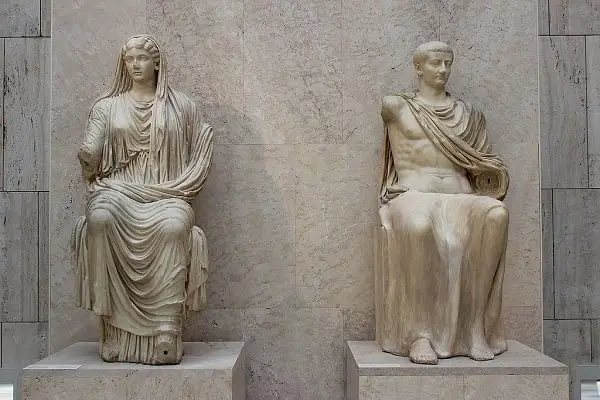
After Augustus claimed to be considerate towards reinstating the Republic, while Livia looked after the family, she started plotting a conspiracy to ascend her son to the throne.
Augustus had only one child from his ex-wife, a daughter who possibly would not be regarded as eligible to succeed her dad.
Livia started persuading her husband to push her sons into power as an ambitious mother.
She put all possible efforts into escorting her sons into the royal seat and even got Tiberius married to Augustus’ daughter Julia in 11B.C.
Tiberius was adopted as royal heir in 4 B.C after his marriage to Julia. Her other son Drusus married Antonia Minor, niece of Emperor Augustus.
Unfortunately, Drusus lost his life in a battle in 9 B.C after he fell off his horse.
Julia had been married to Gaius Claudius Marcellus, nephew of Augustus, and then to Marcus Vipsanius Agrippa, Augustus’s friend. She had three sons who Augustus adopted as his heir.
Livia was anonymously accused of the deaths of Julia’s children and exile, who obstructed her son’s way to the throne.
Livia undoubtedly gained the emperor’s trust with no rivals ahead and served Augustus as a dutiful wife in all of his state matters.
However, she never discussed her plans with the eldest son Tiberius. He had a good grasp of politics and warfare but showed little interest in royal chores.
Tiberius even claimed to have been drained and required rest as he always felt out of place in the imperial palace.
Augustus passed away in 14 C.E from natural causes, as stated by Roman Senators.
But rumors spread all over Roman that Livia had poisoned him; however, no fine shreds of evidence were found.
Livia ordered the soldiers to seal the house and surrounding areas to avoid any disturbances to dying Augustus. Still, her aim was to secure control over him until his last breaths.
She did not publicly announce the emperor’s death until Tiberius had complete control over the Praetorian Guards.
Augustus mentioned that he had adopted Livia and entitled her “Augusta” in his will. She became known as Julia Augusta and had supreme authority after her husband’s death.
Livia Drusilla’s Life as a widow
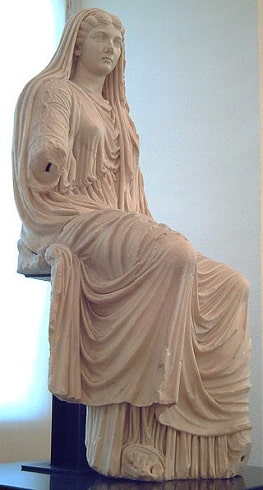
Aged Augustus, dependent on Livia, provided her with honorific status during his last days.
Roman Temples were restored under her guidance as a mother to the nation in the coins; Livia was also reserved for vestal virgins.
Tiberius, now an emperor, got along with his mother very well for the time being.
Actions not in Livia’s interest resulted in treason during the ’20s. By 24 C.E, he granted a theater among Vestal Virgins to his mother.
Soon, the clashes of opinions started reflecting among Livia and Tiberius. He resented her action of giving him an idea of the royal seat.
At 56, he did not enjoy Livia’s political interferences as they made him feel inferior.
Livia’s sour and stubborn personality created a shaft between the mother and son.
She had dedicated a statue to Augustus in central Rome where her name was ordered to be placed even before Tiberius, which raged him even more.
She had unofficially begun exercising extreme powers. When a fire broke out nearby the temple of Vesta, Livia took all the charges regarding crowd control and firefighting.
It deepened her roots of popularity which was not in favor of Tiberius.
Livia easily persuaded Tiberius to show mercy on her pal Plancina who was accused of attempting to murder Augustus’s great-grandson, Germanicus.
As a sign of respect, he could not deny her; indeterminately, he belated his appearance in the courtroom. These instances indicated the dimming of their bond.
Tiberius complained about his mother vexing him to appease her desire to become co-ruler of the Roman Empire.
The honors and tributes paid to her during Augustus’s regime were commanded to be removed. In addition, he forbade Senators to address her as “Augusta.”
Deterioration of their relationship drastically dropped when Tiberius finally stepped out of Rome and would not return even for Livia’s last rites.
Livia Drusilla’s Relation with Octavian
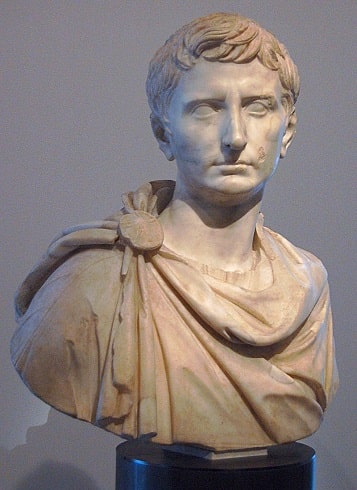
Octavian also called Augustus to marry Livia not just for love but as a social and political strategy.
She belonged to a leading aristocratic family whose connections were politically crucial.
On the other hand, Livia proved to be a dedicated and dutiful wife who helped Octavian secure his reputation.
She could please her husband, and his dependency on her increased.
In later life, she realized Octavian’s prominent character, so she easily manipulated him for her benefit.
She was well aware of his reliance upon her and utilized it to emerge as a tremendous political wheeler which was relatively unheard of those days.
A public statue was built in homage to Livia, a radical shift from male-dominant monarchism toward women.
She regarded Octavian as a man who could resist her decision; however, she always proclaimed not to have mingled his opinions.
When queried about her succession to please Augustus, she told him the possibility by not dominating his ideas, joyfully doing whatever he longed for, and pretending not to be concerned about any of his affairs.
Livia Drusilla’s Lifestyle
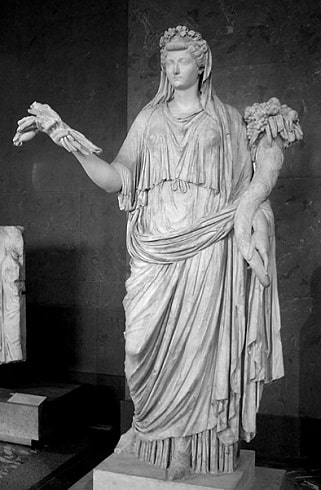
Despite being associated with the Roman Royal family, Livia was never spotted wearing lavish costumes.
She supported her husband’s resolution of remaining as low profile as any citizen would live.
The clothes were handwoven at home, including a decent cotton tunic with a waistband.
Antique metal medallions pinned a decorated stole to the shoulders. She was always portrayed in statues and paintings with a stole covering most of her hair.
She was famous for her nodus coiffure hairstyling that every woman in Rome depicted.
Livia had a significant role in advancing women’s dignity, an epitome of beauty and feminine modesty.
Death of Livia Drusilla
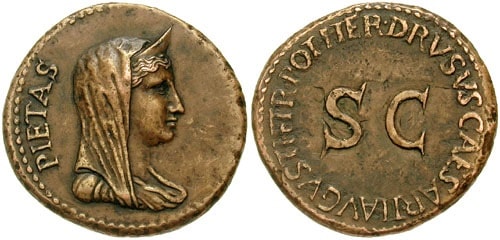
Livia took her final breaths in 29 C.E with unknown causes, parting from the physical world at the age of 86. Nero Tiberius had moved out of Rome and ruled it through Capri’s proxy.
Heavily loathing his mother’s actions, he did not feel it necessary to attend her funeral.
Subsequently, he did not probate Livia’s will and overruled all Augustus permitted concessions.
Conclusion
Livia was considered a submissive wife and overbearing mother, contrary to being a devoted and influential wife in various forms of modern and ancient literature.
She greatly impacted Roman governance prevailing in the shadows of the most loved emperor Augustus.
The feeling of leading her sons to power swayed her towards multiple positive and negative deeds, including murder attempts on feasible heirs to the throne.
Augustus, deeply attached to her, did not refrain from implanting every plan she drafted.
Although Nero, her eldest son, implemented her political ideologies in need, he held grudges against his mother due to numerous disagreements on diplomatic affairs.
The resentment got so severe that he did not attend her funeral.
Her grandson Claudius finally restored the tribute paid to her that was vetoed following her death.
Indeed, a woman of diligence and amiable ambitions, Livia left behind a dual reputation as a diplomat for her husband and dissimulation for her son.
